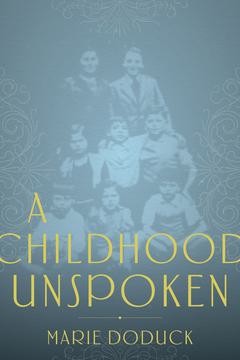A Childhood Unspoken
I was on a farm, I think — I’m not sure which one; the child Mariette didn’t organize time like we do, and I never learned names or faces — and it was my birthday, and the woman I was living with took me back into the city, into Brussels, so that I could celebrate my birthday with my mother. I hadn’t been home for a long time, so I was excited to see Maman. I remember walking with this woman down the street, and in the distance I could see my mother, and with her was my brother Albert. And I remember thinking how beautiful she was, all dressed up to celebrate. I could see her hair, and how carefully she had done it, in waves. I was so happy to see her again, and I thought how lucky I was to be able to spend my birthday with my mother and that this was the best present I could have been given. Suddenly, the woman I was walking with took hold of me roughly and covered my mouth, just as I was going to call Maman, to stop me from yelling. A truck had driven up to where my mother and brother were and stopped. Germans flooded out and grabbed my mother and brother and put them in the truck. Just like that. I never saw them again.
Since then, I have refused to celebrate my birthday, which is on May 10. For many years, I didn’t explain to my husband or children why. I would just say that it was close to Mother’s Day and Mother’s Day was enough. How do you share such a painful memory? How do you say, as a grown woman, that the child in you relives that memory each year on her birthday, and how can you celebrate anything while reliving such a painful event?
For many, many decades I thought I had seen my mother being taken away in 1942, around my seventh birthday. Very recently I learned that this happened in 1943. Documents in the Belgian archives list my mother’s arrest date, along with Albert’s, as May 27, 1943. So I surmise that I was returning home to celebrate my eighth birthday, not my seventh birthday, as I remembered. This detail may seem minor, but it is incredibly important to me, and it was also an enormously relieving discovery. For so long I had lived with this memory inside me but could not say for sure that was how it had happened. To find out that your memory, your truth, is also real…that is a feeling I cannot easily describe.
A Childhood Unspoken, Marie Doduck
Mariette is only five years old when the Nazis invade her hometown of Brussels, Belgium, in 1940. Soon her family is torn apart, and Mariette and her siblings are scattered across the city and countryside, hiding with non-Jews and in convents and orphanages or working for the resistance. Seeing violence and death all around her, Mariette learns the skills she needs to survive — how to throw a knife, jump from a moving vehicle and, most importantly, stay silent. Mariette emerges from the war quick-thinking, fiercely independent and ready to start a new life in Canada. As she navigates a transition to a new identity as Marie — an industrious and resourceful community member, mother and advocate for children’s rights — Mariette, the silent child, begins to find her voice.
Introduction by Lauren Faulkner Rossi
- En bref
- Belgique
- Clandestinité
- Projet des orphelins de guerre
- Immigration au Canada en 1947
- Adaptation à la vie canadienne
- Livre numérique accessible
- Ressources éducatives disponibles: Seeking Refuge
- Marie Doduck
216 pages
Western Canada Jewish Book Award for Holocaust Literature 2025
À propos de l’autrice

Marie (Mariette) Rozen Doduck est née en 1935 à Bruxelles, en Belgique. En 1947, elle a immigré au Canada, avec trois autres membres de sa fratrie, grâce au Projet des orphelins de guerre. Ils ont fini par s’établir à Vancouver. En 1955, Marie a épousé Sidney Doduck, avec qui elle a eu trois enfants. Elle a voué une grande partie de sa vie d’adulte à l’enseignement de l’histoire de l’Holocauste et compte parmi les membres fondateurs du Vancouver Holocaust Education Centre. Son engagement lui a valu de nombreuses reconnaissances, notamment sa nomination à l’Ordre du Canada en 2024.


